Are Stink Bugs Bad For Your Garden
Stink Bugs love citrus trees and their fruit. They will happily infest your lovingly tended fruit trees and leave you with fruit that has had the life and juice sucked out of them or no fruit at all. Stink bugs have to go. But if don't want to use a chemical spray, how can you get rid of them naturally with organic citrus pest control? Here we look at three solutions to naturally remove stink bugs from citrus trees in your food garden.

There are commercial chemicals that will kill stink bugs on citrus trees. Unfortunately many are also detrimental to beneficial insects, including bees. Thankfully, there are natural alternatives to using chemicals. And of course, nothing beats the taste of organically grown, pesticide-free food.
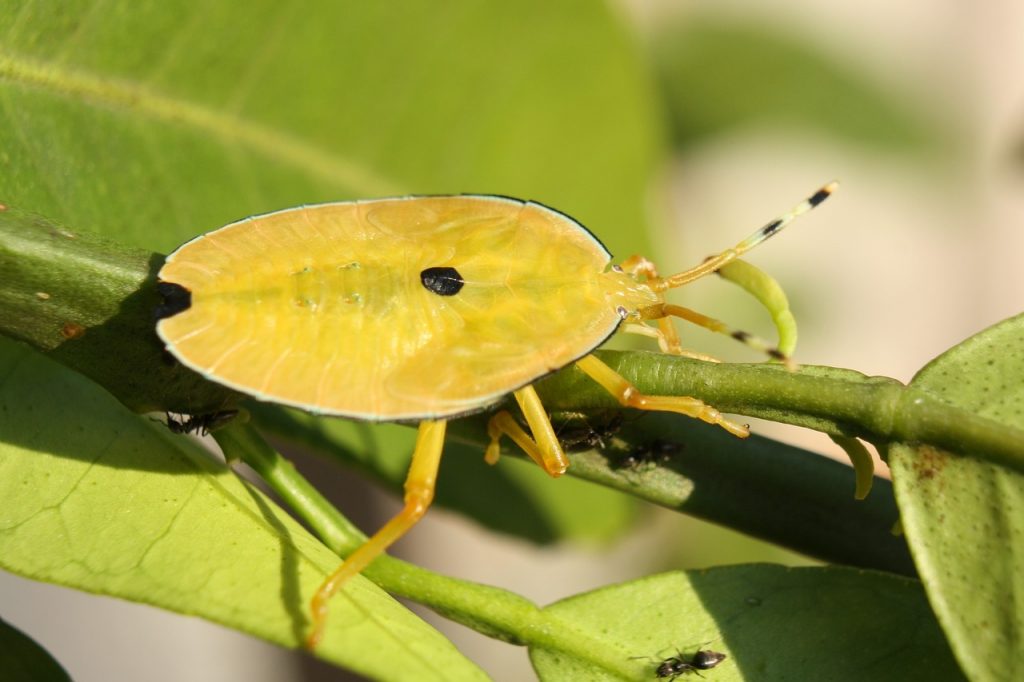
Methods of Naturally Removing Stink Bugs
It is important to remember personal safety when naturally removing stink bugs from citrus trees. Stink bugs squirt a foul-smelling liquid when they feel threatened and this is very dangerous if it gets in your eyes. Always wear protective eyewear, long-selves, hat, and gloves to minimize the risk of stick bug spray on your skin.
A note on gloves: if you choose to pick the bugs off using your gloved hands (instead of tongs, for example), ensure the gloves are water-proof. As you can see by the below picture of my hand, if the stink bug spray gets on your skin (this one was from a Bronze Orange Bug), it's very difficult to remove. In the image below, the stink bug liquid stain on my hand shown here, lasted around 5 days and the embarrassment a little longer.
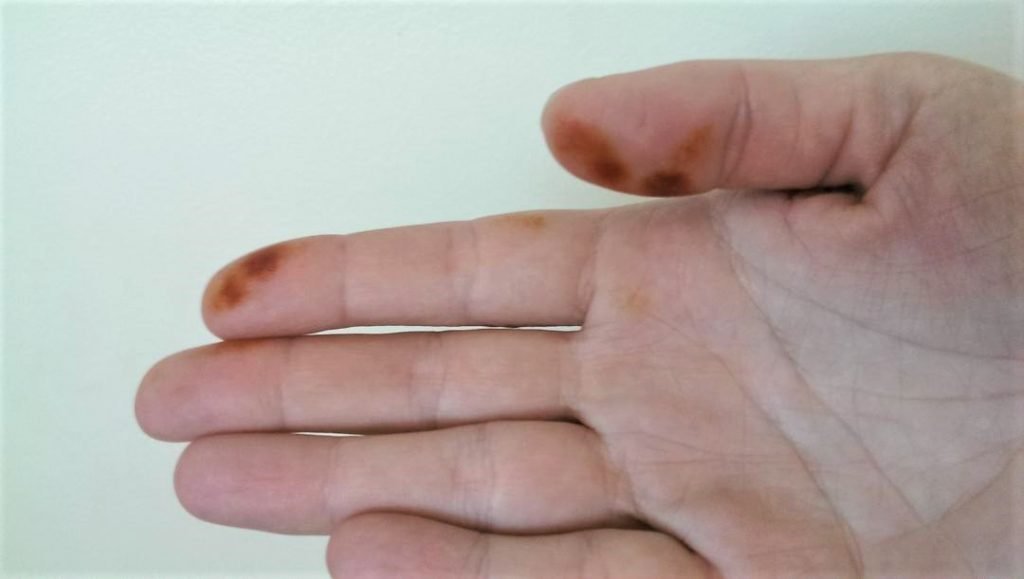
There is no easy way to remove stink bug stain from your skin. The stain will fade naturally within a few days.
Some methods of stick bug stain removal on skin that have been tried include washing with soap and water, vinegar, baking soda, olive oil with salt, and milk. Unfortunately, they do not work.
The stick bug stain looks unsightly but it is not doing you any additional harm now that you have it. The stain will fade with time.
1. Manual Removal into a Soapy Water Bucket
Materials:
Bucket
1 oz (30ml) dishwashing liquid
Tongs
Method:
Fill the bucket a 1/4 of the way with warm water, add dishwashing detergent and gently mix. Use the tongs to carefully remove the stink bugs and drop them into the bucket of warm detergent water. The soapy water will kill the stink bugs.
Pro's: Safest out of all the methods for your citrus tree.
Con's: Time-consuming.
2. Soapy Water Spray
Materials:
Spray bottle. Our example uses a 16 oz (500ml) glass spray bottle. A plastic or glass spray bottle can be used. You can adjust the measurements according to the size you already have.
1 oz (30ml) mild dishwashing liquid
Method:
Add the detergent to a spray bottle, fill halfway with water and give it a shake to mix. Then simply spray the stink bugs as you see them. Give stinkbugs a few big squirts to ensure they are covered in the solution. The detergent acts to kill the stink bug.
Warning: If possible, try to minimize spraying the foliage as dishwashing liquid can cause burning to the leaves. Diluting the dishwashing liquid ensures minimum risk of this, however, it is still advisable to minimize spraying the foliage.
Pro's: Very simple and quick method of removal.
Con's: Need to avoid spraying the foliage in case of leaf burn caused by detergent.
I have used both methods and now prefer this method because it is so easy. I have never had an adverse reaction due to the diluted dishwashing liquid on the foliage.
3. Vacuum Stink Bugs
Gardeners have reported great results in removing stink bugs naturally by using an old vacuum cleaner.
Things to be aware of are, the vacuum should be old or a dedicated vacuum for stink bug removal as they will spray inside the vacuum. The odor will linger!
If you have a paper bag vacuum, the bag can be removed, sealed, and disposed of in an outside bin immediately following the removal of stink bugs. If you have a bag-less vacuum, stink bugs can be emptied into a bucket of warm water and detergent as described in method one above.
Pro's: This is a natural, organic control of stink bugs, and this method of removal that is effective. This method can also remove large numbers of stink bugs quickly.
Con's: This method requires the use of an old or dedicated vacuum. The vacuum will then need to be stored for future use. Access to power is required for electric vacuums. The stink bugs collected in the vacuum will need to be removed and disposed of.
Too Many Citrus Trees
If the process of manual removal above is too overwhelming because you have too many citrus trees and you would like a solution that may be long-lasting but still an organic citrus pest control, you can use Neem Oil. The process of spraying Neem Oil has been reported to significantly reduce stink bugs, believed to be a result of smothering the eggs and juvenile stink bugs.
For the prevention of stink bug infestation, Neem Oil application should start in late winter and then following the manufacturer's directions for further applications throughout the season.
If Neem Oil is used on large adult stink bugs it will not be effective. Treatment needs to start before the weather warms up when the stink bugs are small.
You can purchase Horticultural Neem Oil here.
Related reading: How To Grow A Lemon Tree With Prolific Fruit At Home and How to Grow Kumquats: Complete Guide To Kumquat Tree Care.
What Are Stink Bugs?
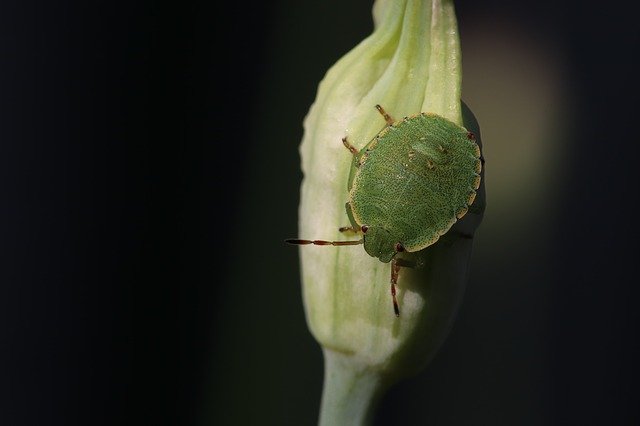
There are thousands of different types of stink bugs worldwide. In North America, the Brown Marmorated stink bug is most evident attacking food gardens and the Southern Green stink bug is most often found attacking citrus while in Australia, Bronze Orange Bugs, among others, are out in force in the warmer months.
Stink bugs characteristically spray their foul-smelling liquid when they feel threatened. This wards of its predators.
Stink bug activity starts in late winter but is most noticeable in the warmer weather of spring and summer and through fall. They are often missed by gardeners in the late winter as the bugs are small and in some cases, such as the Bronze Orange Bug, they start their life as a small green bug and camouflage with the tree leaves.
Which Plants Do Stink Bugs Eat?
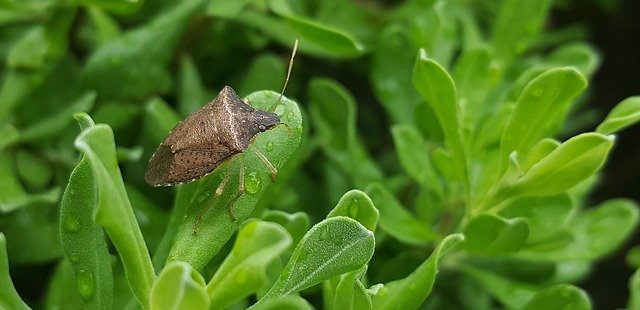
Stink Bugs are notorious for attacking citrus trees but depending on the species of stink bug, they can also attack other fruits, vegetables, ornamental plants, grain crops and even weeds! Some stink bugs will also make their way into homes causing all sorts of trouble.
How Do Stink Bugs Damage Plants
Stink bugs feed on citrus trees by sucking the sap on the tree stems and fruit. The result, if left untreated, is that flowers and fruit will drop off the tree. In less severe damage, the tree may still hold its fruit but the end result may be fruit that's not juicy with possible scaring to the skin, making them inedible.
Monitor Your Citrus Trees and Food Plants
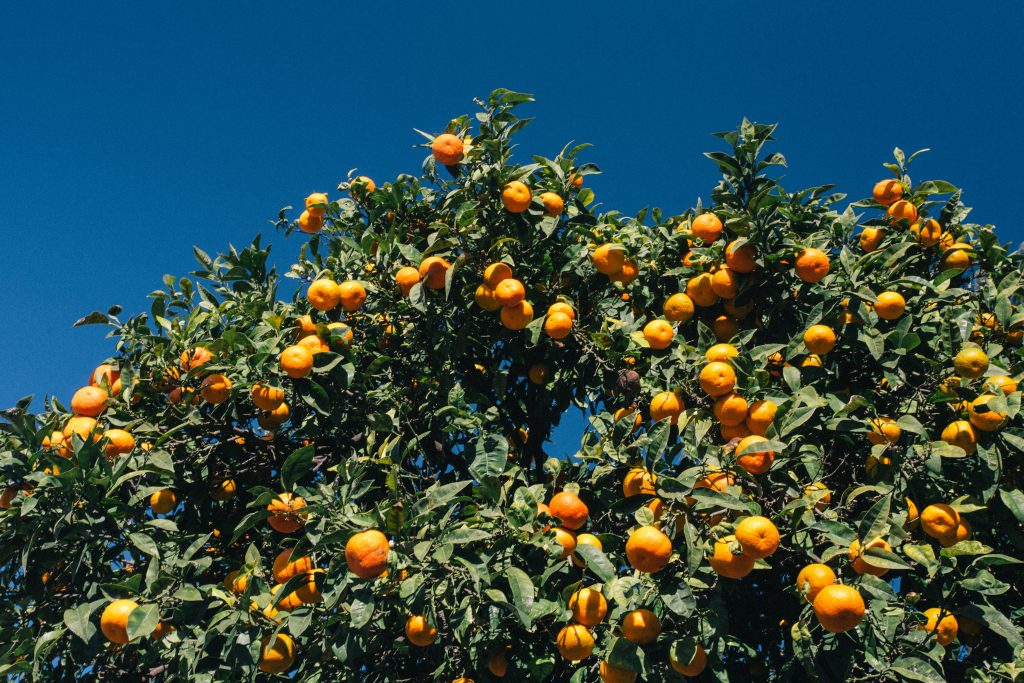
The very best defense against stink bug infestation is to monitor your citrus trees regularly. Inspect your citrus trees at least weekly during the warmer weather when stink bugs are active. When you see stink bugs, take action to rid them. If you leave them for too long, they will breed, multiply rapidly and make your job of removal a bigger one than it needs to be.
Check under the leaves as stink bugs are good at hiding. During the heat of the day, stink bugs move closer to the trunk of the tree to keep cool.
Citrus trees will always cope better with stress (including stress caused by stink bugs!) if fertilized regularly. I recommend this organic citrus fertilizer here.
Conclusion
Stink bugs are a food garden pest. However, you can safely remove them naturally and continue to enjoy the fruits of your labor, sorry, bad pun intended! So come spring and summer, when these bugs are at their peak, remember to check your citrus trees regularly for any stink bug activity and be prepared to take action to remove them.
Recommended Products:
Horticultural Neem Oil
Reusable Glass Spray Bottle – plastic or glass bottles can be used to make up the Soapy Water Solution to spray Stink Bugs. I really like this option to help reduce plastic.
Plastic Spray Bottle – As above, either plastic or glass spray bottles can be used.
Organic Citrus Fertilizer – help citrus trees cope with stress by feeding them well with an organic citrus fertilizer.
Related reading:
Milk Spray: Vegetable Garden Natural Fungicide For Powdery Mildew
Natural and Organic Vegetable Garden Weed Control Methods
Best Organic Mulch for the Garden and Natural Mulch Ideas
Why is My Kumquat Tree Dropping Fruit (And How To Fix It)
Citrus Leaf Miner Control: Natural And Organic Methods
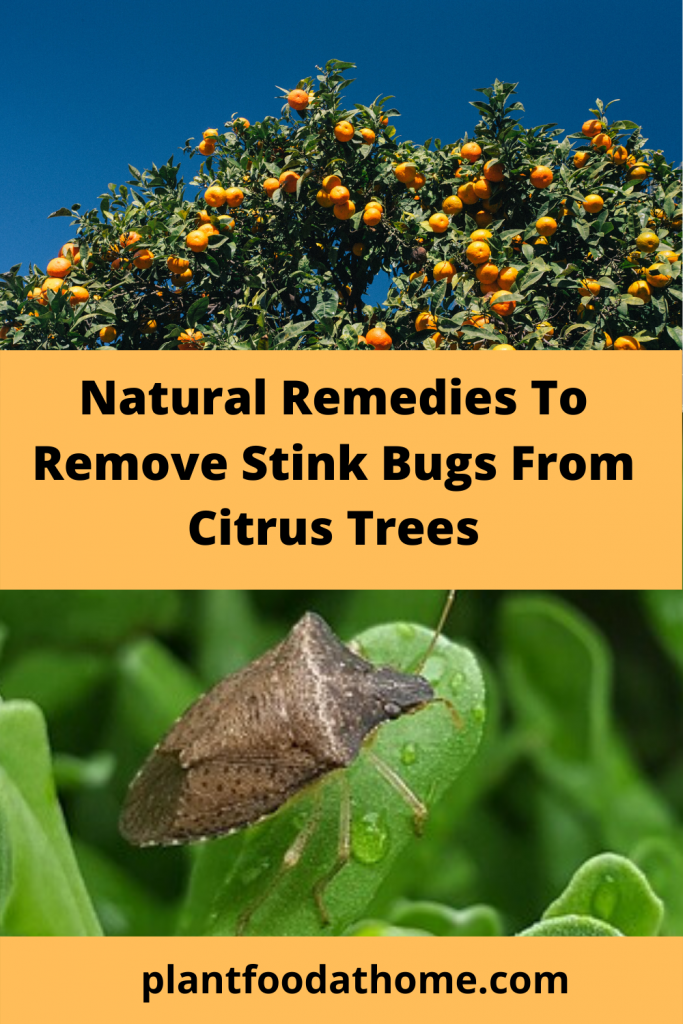
Are Stink Bugs Bad For Your Garden
Source: https://www.plantfoodathome.com/natural-removal-stink-bugs-from-citrus-trees/
Posted by: arndtthemen.blogspot.com

0 Response to "Are Stink Bugs Bad For Your Garden"
Post a Comment